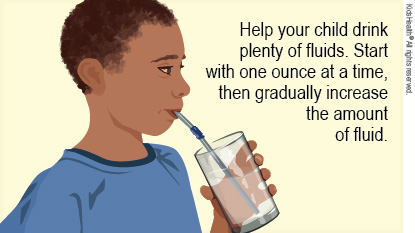Vomiting: How to Care for Your Child After Being in the Hospital
Your child was dehydrated and needed care in the hospital. The nurse may have given medicine to stop the vomiting. Most of the time, vomiting is due to gastroenteritis. This is usually caused by an infection of the stomach and intestines. Kids also may have nausea, diarrhea, and a fever. Your child is now hydrated, not vomiting, and ready to be cared for at home.


-
Let your child rest as needed.
-
If your child begins to vomit, give fluid:
-
Start with an oral electrolyte solution (such as Pedialyte®, Enfalyte®, or a store brand) and give it as instructed.
-
You also can give frozen electrolyte pops (such as Pedialyte® or a store brand), water ice, and flavored gelatin.
-
Do not give your child:
-
sports drinks or full-strength (undiluted) fruit juices, which have a lot of sugar
-
medicines for nausea, diarrhea, or vomiting unless told to by your health care provider
-
You can give medicine for pain if your health care provider says it's OK. Use these medicines exactly as directed:
-
acetaminophen (such as Tylenol® or a store brand)
-
OR
-
ibuprofen (such as Advil®, Motrin®, or a store brand)
-
Don't give aspirin to your child or teen, because it has been linked to a rare but serious illness called Reye syndrome.

Your child has:

Your child:
-
has severe belly pain
-
has a swollen or hard belly
-
has vomit that's bright green, red, or brown
-
is extremely tired and hard to wake up
-
appears dehydrated; signs include dizziness, drowsiness, a dry or sticky mouth, sunken eyes, crying with few or no tears, or peeing less often (or having fewer wet diapers)

How can we prevent gastroenteritis from spreading? To help prevent the spread of gastroenteritis, teach all family members to wash their hands well and often. They should wash for at least 20 seconds with soap and water. Clean tabletops, doorknobs, and other hard surfaces with a cleaner that kills viruses. Keep your child out of child care or school until 24 hours have passed with no vomiting.